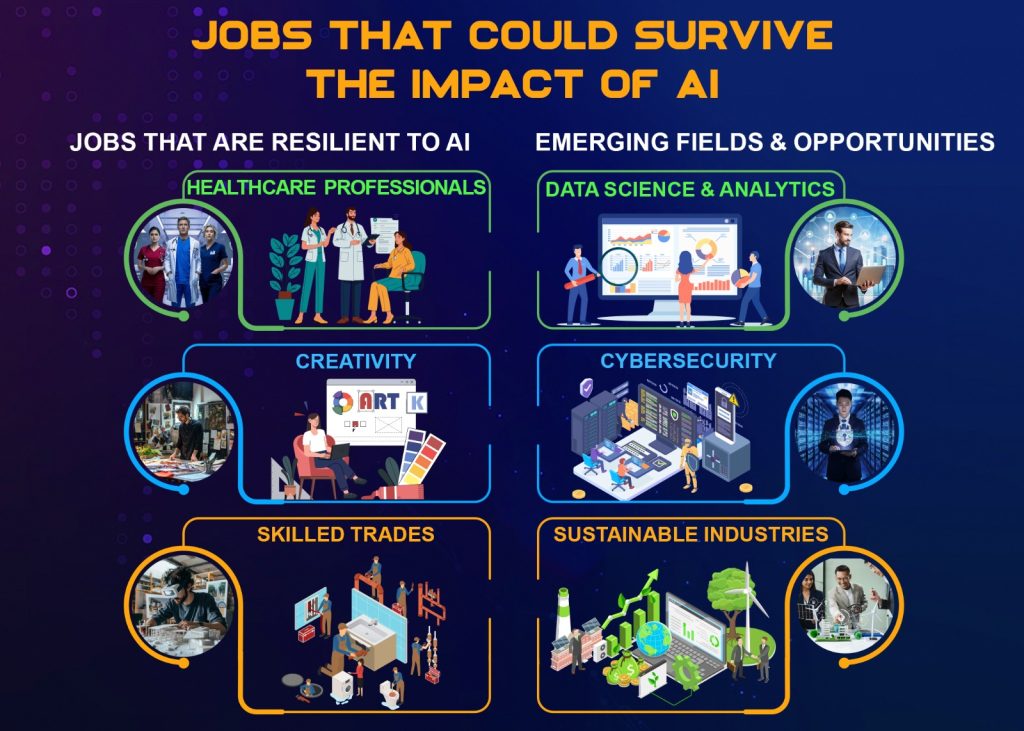Jobs That Could Survive the Impact of AI
Artificial intelligence and automation have become transformative forces in the global economy, reshaping industries and redefining the nature of work. From manufacturing to finance, healthcare to transportation, these technologies have not only enhanced efficiency and productivity but also sparked important debates about their impact on employment. So, what does this mean for your career? How can you navigate the evolving job market in the age of AI? Let’s explore how AI and automation are reshaping industries and uncover strategies for future-proofing your career.
The AI Impact on Traditional Industries
AI’s influence is evident across multiple sectors:
- Manufacturing: Robots powered by AI algorithms are streamlining production processes, significantly boosting productivity while reducing the need for traditional assembly line jobs (Brynjolfsson & McAfee, 2017).
- Transportation: Autonomous vehicles are set to revolutionize this industry, potentially minimizing the demand for human drivers (Goodall et al., 2019).
- Finance: AI-driven algorithms are transforming high-frequency trading, risk assessment, and financial forecasting, affecting roles traditionally held by analysts and traders (Marr, 2020).
- Customer Service: AI chatbots are automating routine customer inquiries, reshaping the dynamics of human-agent interactions (Amershi et al., 2019).
Jobs That Are Resilient to AI
Despite these shifts, certain professions exhibit strong resilience to automation due to their reliance on uniquely human skills:
- Healthcare Professions: Roles such as
- doctors and nurses require a combination of technical expertise and human empathy, making them less susceptible to automation (Topol, 2019).
- Creative Professions: Jobs in art, writing, design, and entertainment rely heavily on originality and imagination—qualities that AI struggles to replicate convincingly (McCormack et al., 2019).
- Skilled Trades: Hands-on professions like plumbing, carpentry, and electrical work demand physical dexterity and problem-solving abilities in unpredictable environments, rendering them less prone to automation (Holmes et al., 2019).
Emerging Fields and Opportunities
The age of AI isn’t just about job displacement; it’s also about the creation of new opportunities:
- Data Science and Analytics: As organizations generate massive amounts of data, the demand for professionals who can interpret and derive insights from this data is skyrocketing (Marcus & Davis, 2019).
- Cybersecurity: With increasing digital threats, cybersecurity experts are in high demand to protect sensitive information and infrastructure (Vinuesa et al., 2020).
- Sustainable Industries: Careers focused on environmental conservation, renewable energy, and sustainable development are gaining momentum as global priorities shift towards sustainability (Rolnick et al., 2019).
Adaptability and Lifelong Learning
In a rapidly evolving job market, adaptability and continuous learning are crucial:
- Lifelong Learning: Engage in online courses, workshops, and professional development programs to keep your skills relevant and competitive.
- Networking: Building connections across diverse industries can open doors to new opportunities and provide insights into emerging trends.

Embrace Your Humanity
Amidst all the technological advancements, it’s important to remember that your unique human abilities hold immense value in an automated world. Emotional intelligence, critical thinking, creativity, and empathy are irreplaceable by machines.
So, dare to dream big, invest in your development, and embrace your humanity as you navigate the future of work.
Join the Conversation
What are your thoughts on future-proof careers in the age of AI? Share your insights, experiences, and aspirations in the comments below. Let’s spark a conversation and learn from each other as we navigate the evolving job landscape together.
If you found this article helpful, consider visiting to our website for more insightful content on navigating the future job market, developing essential skills, and unlocking your full potential. Share our page for the needy so that they can update themselves and we get motivated to upload further content. Thank you for being a part of our community!
For further assistance, visit our channel and refer this video link below

References
- Amershi, S., et al. (2019). Guidelines for Human-AI Interaction.
- Brynjolfsson, E., & McAfee, A. (2017). The Business of Artificial Intelligence.
- Goodall, N. J., et al. (2019). Ethical Decision Making in Autonomous Vehicles.
- Holmes, W., et al. (2019). Artificial Intelligence in Education.
- Marr, B. (2020). The Future of AI: How Artificial Intelligence Will Change the World.
- Marcus, G., & Davis, E. (2019). Rebooting AI: Building Artificial Intelligence We Can Trust.
- McCormack, J., et al. (2019). Creative AI: The Future of Artificial Intelligence and Creativity.
- Rolnick, D., et al. (2019). Tackling Climate Change with Machine Learning.
- Topol, E. (2019). Deep Medicine: How Artificial Intelligence Can Make Healthcare Human Again.
- Vinuesa, R., et al. (2020). The Role of Artificial Intelligence in Achieving the Sustainable Development Goals.
Share This :

